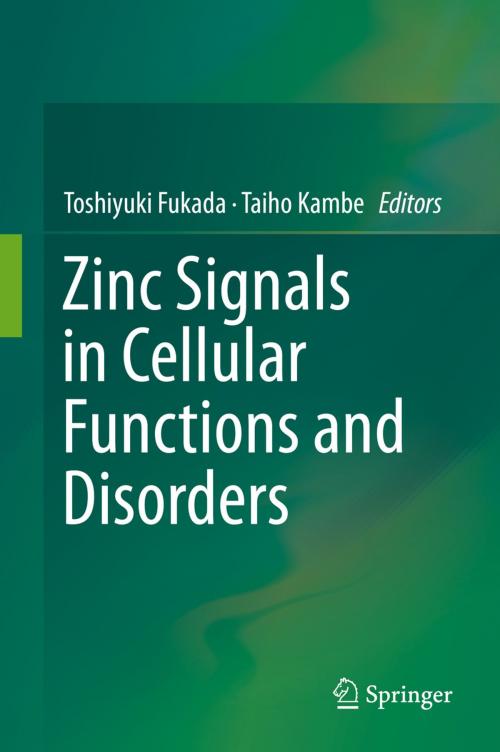Zinc Signals in Cellular Functions and Disorders
Nonfiction, Science & Nature, Science, Biological Sciences, Cytology, Other Sciences, Molecular Biology| Author: | ISBN: | 9784431551140 | |
| Publisher: | Springer Japan | Publication: | September 25, 2014 |
| Imprint: | Springer | Language: | English |
| Author: | |
| ISBN: | 9784431551140 |
| Publisher: | Springer Japan |
| Publication: | September 25, 2014 |
| Imprint: | Springer |
| Language: | English |
This book describes the crucial role of "zinc signals" in biological processes on a molecular and physiological basis, discussing future directions and questions underlying this unique phenomenon. To accomplish this, a group of worldwide leaders in the field, who have made outstanding contributions, overview zinc signals from a professional standpoint. Zinc plays an indispensable role in various cellular processes. It regulates a great number of protein functions including transcription factors, enzymes, adapters, and growth factors as a structural or catalytic factor or both. Recently, another function of zinc has received extensive interest and attention because of its potential importance as a signaling mediator. Zinc plays a dynamic role as an intracellular and extracellular signaling factor and thus regulates cellular signaling pathways, which enables communication between cells, conversion of extracellular stimuli to intracellular signals, and control of various intracellular events. These functions of zinc have become recognized as “zinc signals,” which play critical roles in physiology, and therefore their imbalance can cause a variety of problems with regard to human health. Because the notion of zinc signals is quite new and no integrative review books focusing on them have yet been published, we believe this book will provide very timely information on the subject and thus should be of importance and interest to a wide range of readers.
This book describes the crucial role of "zinc signals" in biological processes on a molecular and physiological basis, discussing future directions and questions underlying this unique phenomenon. To accomplish this, a group of worldwide leaders in the field, who have made outstanding contributions, overview zinc signals from a professional standpoint. Zinc plays an indispensable role in various cellular processes. It regulates a great number of protein functions including transcription factors, enzymes, adapters, and growth factors as a structural or catalytic factor or both. Recently, another function of zinc has received extensive interest and attention because of its potential importance as a signaling mediator. Zinc plays a dynamic role as an intracellular and extracellular signaling factor and thus regulates cellular signaling pathways, which enables communication between cells, conversion of extracellular stimuli to intracellular signals, and control of various intracellular events. These functions of zinc have become recognized as “zinc signals,” which play critical roles in physiology, and therefore their imbalance can cause a variety of problems with regard to human health. Because the notion of zinc signals is quite new and no integrative review books focusing on them have yet been published, we believe this book will provide very timely information on the subject and thus should be of importance and interest to a wide range of readers.















